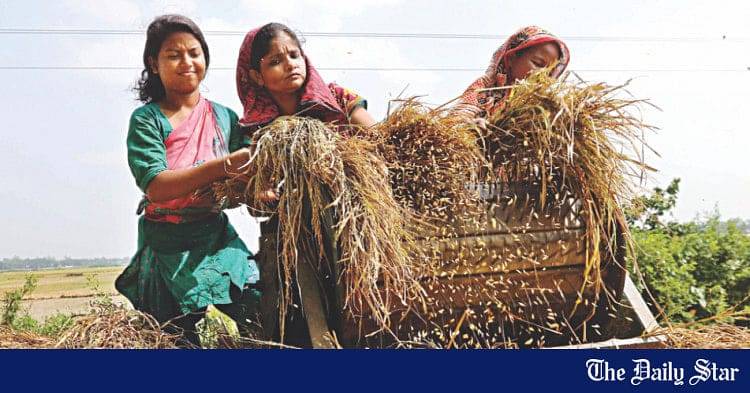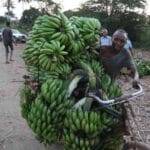Main Points In Hindi (मुख्य बातें – हिंदी में)
-
आयात शुल्क में कटौती की सिफारिश: बांग्लादेश व्यापार और टैरिफ आयोग (बीटीटीसी) ने सरकार को चावल पर आयात शुल्क को अस्थायी रूप से वापस लेने की सिफारिश की है ताकि स्थानीय बाजार में चावल की आपूर्ति बढ़ सके।
-
हालिया बाढ़ों का प्रभाव: कृषि विस्तार विभाग के आंकड़ों के अनुसार, हाल ही में आई दो बाढ़ों के कारण 8.39 लाख टन चावल का उत्पादन बाधित हुआ है, जिससे बाजार में कमी आई है।
-
स्थानीय बाजार की स्थिति: बीटीटीसी ने रिपोर्ट में कहा है कि चावल का आयात प्रोत्साहित करने के लिए शुल्क में छूट जरूरी है, लेकिन 20 अक्टूबर को की गई कटौती से चावल की आपूर्ति बढ़ाने में कोई खास मदद नहीं मिलेगी।
-
आयात लागत और स्थानीय कीमतों में अंतर: वर्तमान में, आयातित बढ़िया चावल की कीमत 80 टका प्रति किलोग्राम और मोटे चावल की कीमत 76 टका प्रति किलोग्राम होगी, जबकि स्थानीय चावल की कीमतें क्रमशः 65 और 55 टका प्रति किलोग्राम हैं, जिससे आयातकों के लिए आकर्षण कम हो गया है।
- खाद्य मुद्रास्फीति की स्थिति: बांग्लादेश में खाद्य मुद्रास्फीति अप्रैल से लगातार 10 प्रतिशत से ऊपर बनी हुई है, जो उपभोक्ताओं की खरीद शक्ति को प्रभावित कर रही है।
Main Points In English(मुख्य बातें – अंग्रेज़ी में)
Here are the main points from the provided text:
-
Import Duty Reduction: The Bangladesh Trade and Tariff Commission (BTTTC) has stated that the reduction of import duty on rice from 62.5% to 25% as of October 20th is still insufficient to significantly lower the prices of imported rice in the local market.
-
Flood Impact on Rice Production: Recent floods from August 16 to October 15 disrupted the production of 839,000 tons of rice, highlighting the necessity for increased rice imports to stabilize local supply and prices.
-
Insufficient Import Activity: Despite the duty reduction, only 26 tons of rice have been imported so far, indicating a lack of incentive for importers to purchase rice overseas due to prevailing market conditions.
-
Price Comparison: Even with the duty cut, the final prices of imported rice could range from Tk 76 to Tk 80 per kilogram, compared to locally produced rice priced at Tk 55 to Tk 65 per kilogram, making local rice more competitive.
- Rising Food Inflation: The report emphasizes ongoing food inflation in Bangladesh, with food prices remaining above 10% for six consecutive months, necessitating measures to protect consumers amidst rising costs.


Complete News In Hindi(पूरी खबर – हिंदी में)
बीटीटीसी का कहना है कि 20 अक्टूबर को शुल्क में कटौती अभी भी आयातित चावल की कीमतों को कम करने के लिए पर्याप्त नहीं है
बांग्लादेश व्यापार और टैरिफ आयोग (बीटीटीसी) ने आज सरकार को स्थानीय बाजार में इसकी आपूर्ति बढ़ाने के लिए एक विशिष्ट अवधि के लिए चावल पर आयात शुल्क वापस लेने की सिफारिश की।
आयोग ने एक रिपोर्ट में कहा कि कृषि विस्तार विभाग के आंकड़ों से पता चला है कि 16 अगस्त से 15 अक्टूबर के बीच हाल ही में आई दो बाढ़ों से 8.39 लाख टन चावल का उत्पादन बाधित हुआ है।
इस स्थिति के बीच, चावल के आयात को तभी प्रोत्साहित किया जाएगा जब आम उपभोक्ताओं की क्रय शक्ति को स्थिर करने के प्रयासों के तहत शुल्क में छूट दी जाएगी।
आयोग ने वाणिज्य मंत्रालय, खाद्य मंत्रालय और राष्ट्रीय राजस्व बोर्ड (एनबीआर) को भेजी रिपोर्ट में कहा कि अगर अंतरराष्ट्रीय बाजारों की कीमत पर चावल का आयात किया जाता है तो स्थानीय उत्पादकों को नुकसान होने की संभावना नहीं है।
आयात को प्रोत्साहित करने और स्थानीय बाजारों में आपूर्ति बढ़ाने के लिए, एनबीआर ने 20 अक्टूबर को चावल आयात शुल्क 62.5 प्रतिशत से घटाकर 25 प्रतिशत कर दिया।
एनबीआर ने यह भी बताया कि टैरिफ कटौती से आयात लागत 14.4 टका प्रति किलोग्राम कम करने में मदद मिलेगी।
हालांकि, शुल्क में कटौती के बाद, आयातकों ने अब तक केवल 26 टन चावल लाने के लिए ऋण पत्र खोले, जैसा कि बीटीटीसी की रिपोर्ट में बताया गया है।
आयोग ने कहा कि शुल्क में कटौती से बांग्लादेश के बाजार में चावल की आपूर्ति बढ़ाने में कोई खास मदद नहीं मिलेगी।
24 अक्टूबर को, एक प्रमुख चावल आयातक ने नाम न छापने की शर्त पर बोलते हुए स्थिति का कारण बताया।
आयातक ने द डेली स्टार को बताया कि बाजार की मौजूदा स्थितियों को देखते हुए यह बहुत कम संभावना है कि कोई भी विदेश से अनाज खरीदने पर विचार करेगा।
उदाहरण के लिए, भले ही शुल्क शून्य कर दिया गया हो, सभी संबंधित लागतों को शामिल करने के बाद आयातित बढ़िया चावल की कीमत 80 टका प्रति किलोग्राम और मोटे चावल की कीमत 76 टका प्रति किलोग्राम तक पहुंच जाएगी।
इसके विपरीत, स्थानीय स्तर पर उगाया गया बढ़िया चावल वर्तमान में लगभग Tk 65 प्रति किलोग्राम और मोटा चावल Tk 55 प्रति किलोग्राम के हिसाब से बेचा जा रहा है।
बीटीटीसी रिपोर्ट में उल्लेख किया गया है कि बढ़िया चावल की कीमत पिछले महीने के समान ही रही, जबकि मध्यम और मोटे किस्मों में क्रमशः 1.74 प्रतिशत और 1.9 प्रतिशत की वृद्धि देखी गई।
पिछले वर्ष के दौरान, तीनों किस्मों में क्रमशः 1.09 प्रतिशत, 9.35 प्रतिशत और 7 प्रतिशत की वृद्धि देखी गई।
इसमें यह भी कहा गया है कि मोटे चावल की कीमत, जो देश में सबसे अधिक इस्तेमाल की जाने वाली किस्म है, पतले और मध्यम विकल्प की तुलना में तेज दर से बढ़ी है।
टैरिफ आयोग की रिपोर्ट में कहा गया है कि बांग्लादेश को सालाना लगभग 3.7 से 3.9 करोड़ टन चावल की जरूरत होती है, जिसमें से अधिकांश घरेलू उत्पादन से पूरा होता है।
बांग्लादेश ब्यूरो ऑफ स्टैटिस्टिक्स (बीबीएस) के अनुमान से पता चला है कि किसानों ने वित्तीय वर्ष 2023-24 में 4.06 करोड़ टन चावल का उत्पादन किया, जो साल-दर-साल 4.1 प्रतिशत अधिक है, जो पिछले छह वर्षों में सबसे अधिक वृद्धि है।
इसके अलावा, पहली बार, बांग्लादेश को एक वित्तीय वर्ष में 4 करोड़ टन से अधिक चावल प्राप्त हुआ।
बीबीएस आंकड़ों के मुताबिक, इस साल अप्रैल से लगातार छह महीनों तक बांग्लादेश में खाद्य मुद्रास्फीति 10 प्रतिशत से ऊपर बनी हुई है।
Complete News In English(पूरी खबर – अंग्रेज़ी में)
The Bangladesh Trade and Tariff Commission (BTTTC) has stated that the reduction in import duties on rice, effective October 20, is still insufficient to lower the prices of imported rice.
Today, the BTTTC recommended that the government temporarily remove import duties on rice to increase its supply in the local market. A report from the commission highlighted that recent floods between August 16 and October 15 have disrupted the production of 839,000 tons of rice.


The BTTTC suggests that encouraging rice imports is necessary to stabilize consumer purchasing power by reducing duties. In a report sent to the Ministry of Commerce, the Ministry of Food, and the National Revenue Board (NBR), the commission mentioned that importing rice at international market prices should not harm local producers.
To boost imports and local market supply, the NBR cut the rice import duty from 62.5% to 25% on October 20. This reduction was expected to decrease import costs by Taka 14.4 per kilogram. However, despite this duty reduction, importers have so far only opened letters of credit for 26 tons of rice, according to the BTTTC report.
The commission indicated that the duty cut may not significantly help increase rice supply in the Bangladeshi market. A key rice importer, who wished to remain anonymous, explained that given the current market conditions, it is unlikely that anyone would consider buying rice from abroad. Even if the duty were eliminated, the total cost of high-quality imported rice would reach Taka 80 per kilogram, while coarser rice would amount to Taka 76 per kilogram. In contrast, locally grown high-quality rice is currently sold for about Taka 65 per kilogram and coarse rice for Taka 55 per kilogram.
The BTTTC report also noted that the prices of high-quality rice have remained stable compared to the previous month, while medium and coarse varieties saw slight price increases of 1.74% and 1.9%, respectively. Over the past year, the prices of all three rice varieties have increased by 1.09%, 9.35%, and 7%.
The report emphasized that Bangladesh requires about 37 to 39 million tons of rice annually, with most of this supplied through domestic production. According to the Bangladesh Bureau of Statistics (BBS), farmers produced 40.6 million tons of rice during the 2023-24 fiscal year, marking a year-on-year increase of 4.1%, which is the highest growth in the last six years. For the first time, Bangladesh has received over 40 million tons of rice in a single fiscal year.
BBS data also revealed that food inflation in Bangladesh has remained above 10% for six consecutive months starting in April this year.
Source link



